Hot Dogs
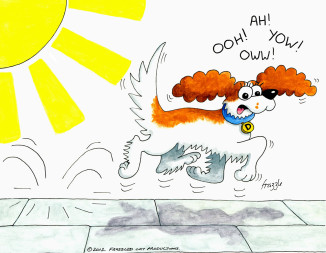 Ten important things to remember about your dog on hot days!
Ten important things to remember about your dog on hot days!
- Dogs prefer shade
- Dogs Walking on hot pavements is like us walking hot coals
- Dogs die in hot cars
- Dogs die of heat exhaustion in Cars – the RSPCA were called out to over 6000 dogs in distress 2011
- Dogs do not handle heat the same way we do
- Dogs do not sweat
- Dogs pant to cool down
- Dogs only have sweat glands in their paws
- Dogs rely on panting to cool down.
- Dogs body temperature is 100.5-102f if this rises to 105-107f the dog is at serious risk of developing heat exhaustion and death will follow quickly
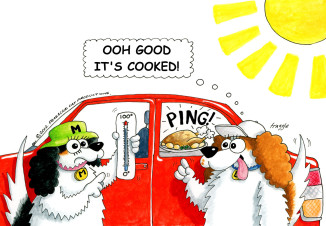 Wild dogs snooze through the hottest part of the day.
Wild dogs snooze through the hottest part of the day.
Wolves hunt Early morning or late evening.
Studies have shown that temperature inside a car can heat up to lethal temperatures within 30 minutes even if the weather is relatively cool.
‘Chilli’ Dogs!
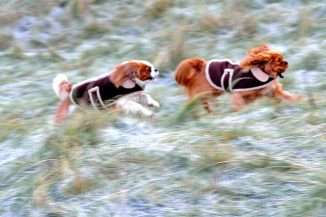 The Cavalier coat is described as a “single coat” , and does not have the same degree of insulation as double coat breeds. They were developed in warmer climates. Even the hardiest dogs developed in more northerly climates were always kept in warm sheltered kennels.
The Cavalier coat is described as a “single coat” , and does not have the same degree of insulation as double coat breeds. They were developed in warmer climates. Even the hardiest dogs developed in more northerly climates were always kept in warm sheltered kennels.
Puppies, older/sick dogs, & dogs with short clipped coats do not tolerate the cold weather and may need a coat when outside In the winter. Adult dogs out in cold weather may also need a coat.
 Look for coats that cover the dog from the neck from the base of the tail [so that the hips are covered] and ideally have a panel to cover the chest area underneath – this also helps to keep them clean. Be careful though that your Cavalier does not overheat especially if they are running around.
Look for coats that cover the dog from the neck from the base of the tail [so that the hips are covered] and ideally have a panel to cover the chest area underneath – this also helps to keep them clean. Be careful though that your Cavalier does not overheat especially if they are running around.
When snow is on the ground this can collect on feathering and between toes which is extremely uncomfortable for the dog. The best way to remove this on return home is to stand the dog in warm water and once the ice is melted, gently dry the dog with a towel and hairdryer so that they do not get chilled.
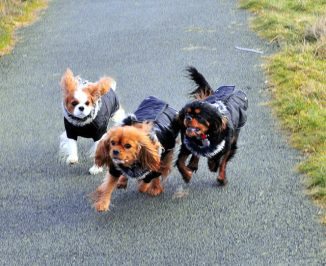 NEVER leave your dog alone in a car during cold weather. A car can act as a refrigerator in the winter, keeping in cold freezing air your Cavalier could literally freeze to death.
NEVER leave your dog alone in a car during cold weather. A car can act as a refrigerator in the winter, keeping in cold freezing air your Cavalier could literally freeze to death.
Antifreeze, which often collects on driveways and roads, is highly poisonous. Although it smells, tastes good and sweet to your Cavalier, it is lethal and will kill.
Salt and grit, used to melt ice on paths and roads, may irritate footpads. Be sure to wash and dry your dog’s feet after a walk. Otherwise your Cavalier could ingest small quantities of these irritants when grooming themselves.
Provide plenty of fresh water. Your dog is just as likely to get dehydrated in the winter as in the summer. Snow is not a satisfactory substitute for water.
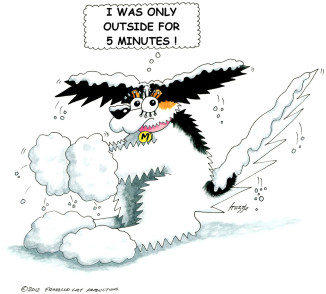 Frostbite is your dog’s winter hazard. To prevent frostbite on its ears, tail and feet, don’t leave your dog outdoors for too long.
Frostbite is your dog’s winter hazard. To prevent frostbite on its ears, tail and feet, don’t leave your dog outdoors for too long.
Be very careful with supplemental heat sources. Fireplaces and portable heaters can severely burn your dog. Make sure all fireplaces have screens, and keep portable heaters out of reach.

